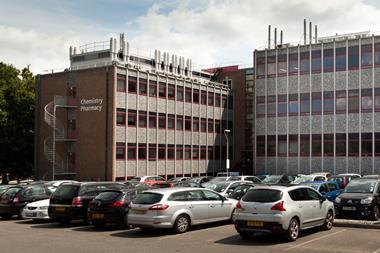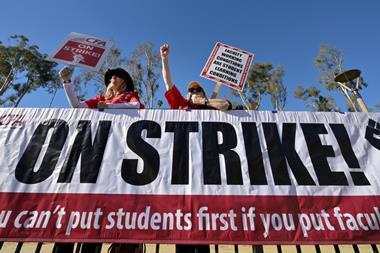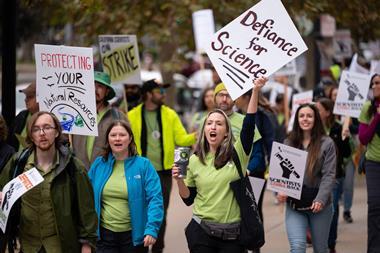University staff will have their pension benefits restored by next April under an agreement reached between Universities UK (UUK) and the University and College Union (UCU), which represents over 120,000 researchers and teaching staff. UCU members have taken 69 days of strike action since 2018 to defend their pension benefits. But the union has vowed to keep the pressure on as it seeks concessions on pay and job security. UCU has balloted its members and will know by the beginning of November if it has a mandate for more strikes.
The deal will restore up to £17 billion to member pensions after universities agreed to reverse the 35% cut made to the industry’s pension scheme – the largest in the UK. An additional £900 million payment will be made to make up for money lost since 2022. The agreement also paves the way for new contribution rates to be introduced in January. Employee contribution rates are likely to fall from 9.8% to 6.1%.
The deal will bring down costs for both members and employers, said Vivienne Stern, UUK chief executive. ‘This has been possible largely as a result of dramatic changes in economic conditions since the last valuation, including high interest rates, combined with the commitment from employers for additional financial backing. When the scheme was in deficit in the past, we took steps to stabilise it. Now that it is in better shape, we are pleased that we can agree to pass on the benefits.’
UCU general secretary Jo Grady called the announcement ‘a historic victory’ and attributed it to four years of strike action and lobbying. ‘This is just the start for our union. We have pension justice. We now move on to delivering justice on pay and job security. We will not stop until we create a higher education sector that properly values its staff.’
Feelings run high
The strikes have proved contentious in university circles and remain a sensitive issue for many with feelings running high. David Fernig, a biochemist at the University of Liverpool and a vocal supporter of industrial action, describes the situation as an ideological struggle. ‘Most university senior management left the boat staff were on over a decade ago and their interests no longer align with those of research and teaching,’ he says. ‘We are 13 years into grinding down our infrastructure for ideological reasons. The only outcome is impoverishment and a relative decline of the UK on the world stage. Universities are the spring for much innovation across the board. Whilst we have flagships that we are justly proud of, without a fleet they will founder.’ Restoring pension benefits is a halfway house, he says; what happens next is anyone’s guess.
The pension deal is a move in the right direction, says one director of education at a Russell Group university, who wants to remain anonymous to avoid the possibility antagonising colleagues. But he’d be surprised if it’s enough to placate some of the more militant branches. ‘The one factor that may work in [my] university’s favour is that the vote in favour of strike action was fairly even last time and a small change may be sufficient to tip the balance.’
While he has some personal sympathy with the aims of the strike, in particular the challenges university staff face with the cost of living, he feels that ‘weaponising’ students in the marking assessment boycott, introduced by UCU in April and ended in September, was a step too far. Students at some institutions did not receive final grades and were unable to graduate as a result. ‘The majority of students currently at university have had a very disrupted couple of years, and then to throw in the boycott was nothing short of cruel. Added to that, the semi-joined-up nature of UCU and Unison action was very effective in amplifying the strike actions to work against any mitigations the university put in place.’
Impact on students
At his university, the strikes only minimally affected the chemistry department. ‘A small number of lab classes and workshops/tutorials were cancelled. But all work was marked to the usual timescale. That said, I was surprised by how many students noted strike action as a negative in the comments on the National Student Survey, so students are clearly finely attuned to even the slightest level of disruption to the normal routine. It was clear from their questions at the time that they were feeling very uneasy about how the strike action would play out, and no level of reassurance was going to placate them.’
However, Fernig says that while the strikes did affect students’ education, the impact was much less than expected. ‘Employers are happily taking on students without a degree, as there are means to understand an individual’s qualities and understanding of a subject in the absence of a piece of paper.’
The question remains whether UCU members have the appetite for more industrial action. The last strikes for which UCU had a mandate were at the end of September. Originally planned at over 140 universities, only around 50 went ahead in one form or another. This action was in protest over universities deducting pay from staff participating in the marking boycott. However, many universities agreed deals to stop pay deductions and some agreed to return docked pay.
Meanwhile, Raj Jethwa, chief executive of the Universities and Colleges Employers Association, said he is continuing to work with UCU and other trade unions involved in disputes on several issues including reviews of pay, workload and contract types. ‘A crucial element of resetting industrial relations in the sector is developing a shared understanding of affordability.’
But disruption continues in the sector regardless. Around 5000 Unison members who are support staff at 17 universities in England went on strike for two days in early October in an ongoing dispute about pay. They included cleaners, IT technicians, administrators and library staff. More than 200 Imperial College workers, including technicians and maintenance and security staff, who are members of Unite, the UK’s leading union, also went on strike in October after rejecting a pay deal of 5.5%. Further strikes are planned.












No comments yet